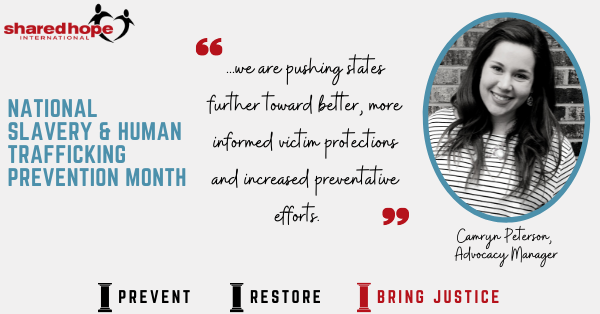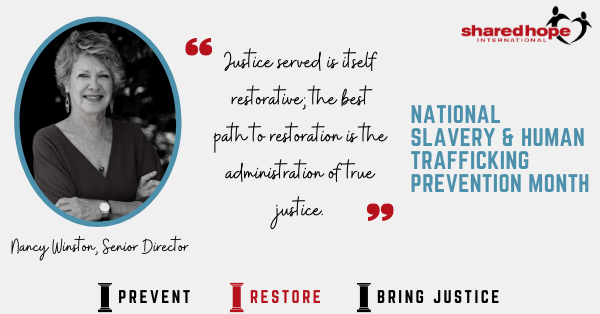Trafficking Victims Protection Reauthorization Act (S. 3946, S. 3949)
Updated: 2/1/2023
In 2022, Congress introduced four Trafficking Victims Protection Reauthorization Act (“TVPRA”) bills which would most notably reauthorize the Trafficking Victims Protection Act (TVPA) authorizations which expired in September 2021. The TVPA provides critical tools needed to combat human trafficking in the U.S. and abroad by authorizing approximately $1 billion for FY 2022 through 2026 to continue currently enacted appropriation and authorization levels for successful anti-trafficking programs. Of the four TVPRA reauthorization bills, two (S. 3946 and S. 3949) were enacted in January 2023. The new laws reauthorize and enhance programs, strengthen laws, and add accountability that reflects the critical need for prevention, protection, and prosecution to combat human trafficking domestically and abroad.
Shared Hope International supports these laws because they are trauma-informed, survivor-centered, and proactive. The policies included in this legislation are bipartisan with broad support from at least 17 different national and state-based organizations. The passage of this legislation will have a direct impact on victims and survivors, whose needs would be addressed through the allocation of necessary funding and the implementation of training and educational programs. Overall, these laws ensure the continuation of existing programs, while also increasing transparency and awareness for human trafficking in the U.S. and abroad, and preventing harm to future victims.
Key Provisions
- Child welfare grants: Shared Hope supports HHS grants to eligible states to develop, improve, or expand programs that assist child welfare programs with identifying and responding to human trafficking, including children trafficked by a third-party (i.e., not familial) trafficker.
- Promoting consistent trafficking definitions: Shared Hope supports efforts to promote nationally consistent definitions of child sex trafficking by urging the removal of third-party control requirements from state trafficking laws that narrow the definition in conflict with the federal definition of child sex trafficking.
In addition to reauthorizing critically needed funds that support survivor-centered responses and accountability for exploiters, the following are some highlights of other important provisions in the TVPRA bills:
- The Abolish Trafficking Reauthorization Act of 2022 ( 3946)
- Authorizes the Sec. of HHS to make grants to eligible states to develop, improve, or expand programs that assist with child welfare programs that assist with identifying and responding to human trafficking to states that have eliminated third-party control requirements. Also requires the state to develop and implement a specialized protocol for responding when victims are exploited by a third-party (i.e., not familial) trafficker.
- The Trafficking Victims Prevention and Protection Reauthorization Act of 2022 ( 3949)
- Makes grants to State child welfare and juvenile justice agencies and child- and youth-serving agencies to collaborate in the collection of data relating to dual status youth and to develop practices, policies, and protocols to confront the challenges presented and experienced by dual status youth.
Notes: Sara’s Law: Shared Hope advocated for the incorporation of “Sara’s Law,” named after child sex trafficking survivor Sara Kruzan, which would enable judges to take into consideration abuse or trauma a child sex trafficking victim has endured to ensure that they do not receive lengthy prison sentences, to be included in TVPRA. Unfortunately, H.R.5150, which would have codified Sara’s Law, did not ultimately pass.








